HEALTH
On NCDC’s tips for cholera prevention
Published
7 days agoon

By PALANG KASMI
THE Nigeria Centre for Disease Control and Prevention (NCDC) has issued a public health advisory on the increasing trend of cholera cases across the country, particularly with the onset of the rainy season. The agency has warned against unsafe hygienic practices like open defecation, indiscriminate refuse dumping, and eating fruits and vegetables that are not properly washed.
Cholera is a food and water-borne disease caused by the ingestion of the organism Vibrio Cholerae in contaminated water and food. The disease is a significant public health concern in Nigeria, where it outbreaks frequently, especially in areas with poor sanitation and hygiene.
According to the NCDC, cholera is a highly infectious disease that can spread rapidly in areas with inadequate water and sanitation facilities. The agency has reported 1,141 suspected and 65 confirmed cases of cholera with 30 deaths from 96 Local Government Areas in 30 States between January 1 and June 11, 2024.
The NCDC has advised the public to take the following precautions to prevent cholera:
– Ensure access to safe, potable drinking water
– Practice proper sanitation and waste disposal
– Ensure appropriate hygiene, including handwashing
– Avoid raw fruits and vegetables, food from street vendors, and raw or undercooked seafood
– Ensure that water is boiled and stored in a clean and covered container before drinking
– Practice good personal hand hygiene by washing hands frequently with soap under clean running water
The agency has also advised healthcare workers to practice standard safety precautions like wearing gloves while handling patients or providing care to an ill patient or relative. State Governments have been urged to prioritize action for solutions that ensure access to and use of safe water, basic sanitation, and proper hygiene practices in communities.
The NCDC has provided toll-free numbers, SMS, and WhatsApp lines for reporting suspected cases of cholera. The agency has also emphasized the importance of adequate financial resources to support sanitation initiatives at all levels of governance.
Cholera is a preventable disease, and the NCDC’s public health advisory aims to sensitize the public on the dangers of cholera and the importance of proper hygiene and sanitation practices to prevent the spread of the disease.
In addition to the precautions listed above, the NCDC has also recommended the following measures to prevent cholera:
– Avoid drinking untreated water from wells, rivers, or lakes
– Avoid eating food from street vendors or stalls that may not have been prepared hygienically
– Avoid close contact with people who have diarrhea or are vomiting
– Avoid swimming in contaminated water
– Avoid eating raw or undercooked seafood
– Avoid eating fruits and vegetables that may have been contaminated with sewage or other pollutants
The NCDC has also advised the public to be aware of the signs and symptoms of cholera, which include:
– Acute profuse, painless watery diarrhea
– Vomiting
– Nausea
– Fever
– Abdominal cramps
– Blood in stool
If you or someone you know is experiencing any of these symptoms, it is essential to seek medical attention immediately. Cholera can lead to severe dehydration and even death if left untreated.
The NCDC’s public health advisory is a timely reminder of the importance of proper hygiene and sanitation practices in preventing the spread of cholera. The agency’s efforts to sensitize the public on the dangers of cholera and the importance of proper hygiene and sanitation practices are commendable.
However, more needs to be done to address the root causes of cholera outbreaks in Nigeria. The country’s poor sanitation and hygiene infrastructure, inadequate access to safe water, and lack of proper waste disposal facilities are some of the underlying factors that contribute to the frequent outbreaks of cholera.
To address these challenges, the government at all levels must demonstrate a commitment to prioritizing sanitation and hygiene as fundamental to national development objectives. Adequate financial resources must be allocated to support sanitation initiatives at all levels of governance.
Furthermore, the government must work to improve access to safe water, proper sanitation, and hygiene facilities in all communities. This can be achieved through the construction of modern sanitation facilities, the provision of safe water sources, and the promotion of proper hygiene practices.
The private sector also has a role to play in addressing the challenges of cholera in Nigeria. Companies and organizations can support sanitation initiatives by providing financial resources, expertise, and other forms of support.
It is worthy of note that the NCDC’s public health advisory on cholera is a timely reminder of the importance of proper hygiene and sanitation practices in preventing the spread of cholera. While the agency’s efforts to sensitize the public on the dangers of cholera are commendable, more needs to be done to address the root causes of cholera outbreaks in Nigeria. The government, private sector, and individuals must work together to prioritize sanitation and hygiene as fundamental to national development objectives.
Addressing child trafficking in Plateau State
By PALANG KASMI
IN recent times, Plateau State has been in the news and social media for the wrong reasons as children from the state have been found to have been trafficked from the state to other parts of the country and even foreign countries.
In a recent trending online video, over 10 teenage Nigerian girls between the ages of 15 and 16 were rescued by authorities after they were trafficked to Ghana for prostitution. Among them were girls from Plateau State. This is just one out of the many arrests this year where Plateau girls were found in the list of girls trafficked for sexual exploitation and domestic work across the country.


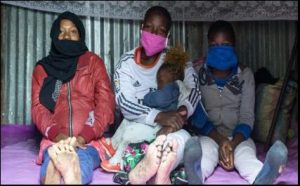
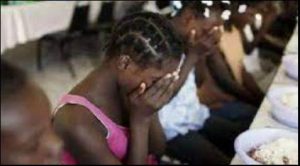
Statistics from the International Labour Organisation (ILO) estimates that fifteen 15 million children are engaged in child labour in Nigeria with 40% of them at the risk of being trafficked both internally and externally for various purposes. They are engaged in domestic labour, prostitution, pornography, armed conflict, farm work and even rituals.
Due to this disturbing trend, Coordinator of Child Protection Network (CPN) in Plateau State, Mrs. Sandra Chikan, has recently in a press statement, condemned the current trend of trafficking children from the state.
Chikan, in the statement made available to newsmen in Jos, stressed that CPN would no longer condone the illicit acts where children and young girls from Plateau State are tricked, forced or persuaded to leave their homes and then transported and forced to work or sold and trafficked for sexual exploitation.
According to her, because of the alarming increase in cases of child trafficking, young girls from Plateau State have on several occasions been lured by syndicates to other countries and states for prostitution and child labour.
“This ugly trend must stop; we have to rise up against it; we will no longer condone this situation, CPN condemns this dastardly act, and we call on parents and guardians to be aware of these criminals,” she declared.
Describing the situation as disturbing, Chikan called for stiffer punishment for perpetrators to serve as a deterrent to others adding: “Parents and community members should not fail in their primary responsibility of protecting and training their children. Government should explore options for implementing policies and engaging stakeholders in a concerted effort to combat this menace and criminality.” She also called on community leaders to report unlawful activities and crimes to law enforcement agencies.
Being one of the northern states battling with security challenges in the country, many communities in Plateau State have been affected by unprovoked attacks and killings, resulting in the displacement of many residents from their ancestral homes in Mangu, Bokkos, Riyom, Barkin Ladi and Riyom local government areas of the state.
While some of the displaced residents have run to seek refuge with their families or relatives, others are forced to live in Internally Displaced Persons (IDP) camps as temporary shelters. Over 500 persons are reported to be IDPs in Plateau State.
At such challenging times, among some of the social ills that affects people living in the IDP camps is Trafficking In Persons (TIP). The human traffickers usually cash in on the humanitarian crisis and pretend to come with solutions. Sadly, they have ulterior motives which usually result to dire consequences, many experts have warned.
Traffickers have a pattern of pretending to render help to unsuspecting victims. They come and pick out of school kids with promises to enroll them into school, or pick girls with a promise for a better life in large cities, only to turn them into wards of high profile sex trafficking rings, at the national or international levels. Most victims lured into sex trafficking during interviews said they were promised good jobs and a better life by the traffickers only to discover a different ball game when they arrived their new destinations.
Poverty is a significant factor in child trafficking in Plateau State. Many families in the state struggle to make ends meet, and they may see child trafficking as a way to generate income. Traffickers often target poor families, promising them large sums of money in exchange for their children.
According to the United Nations, poverty is a major driver of child trafficking in Nigeria. The organization estimates that over 70% of children who are trafficked in Nigeria are from poor families.
“Poverty is a major challenge in addressing child trafficking in Nigeria,” said a UN official. “Many families are desperate for income, and they may see child trafficking as a way to escape poverty.”
The lack of education and unemployment are also significant factors in child trafficking in Plateau State. Many children in the state do not have access to education, and they may be forced to drop out of school to work and support their families.
According to the UNESCO Institute for Statistics, over 10 million children in Nigeria are out of school, and many of them are from Plateau State. The lack of education makes them vulnerable to trafficking, as they may not have the skills and knowledge to protect themselves from traffickers.
In May 2022, a publication of the News Agency of Nigeria, NAN, revealed some tips released by the National Agency for the Prohibition of Trafficking in Persons (NAPTIP), about some tricks used by human traffickers to lure their victims.
It read: “The traffickers often capitalised on victims’ ignorance. The new tricks utilised by Traffickers In Persons (TIP) include technology, hunting, fishing, surrogacy, sports; especially football, orphanage and homes, among others. Before now, the human traffickers were using direct contact, also known as physical contact, but have opted for the new tricks. The traffickers often leverage social media to reach the public, especially their target.
“Orphanage trafficking is more rampant with unregistered orphanages and homes, with owners canvassing for poor parents under the disguise of caring for their children. We appeal to all parents to check the legal status of the Orphanage with the relevant local government area before releasing their wards. Traffickers often disguise as orphanage operators.”
Despite these efforts, much work remains to be done. Child trafficking is a complex issue that requires a sustained and coordinated response from all stakeholders. It is only by working together that we can hope to protect our children from this scourge and ensure that they are able to grow and thrive in a safe and supportive environment.
The many troubles of the boy child
By PALANG KASMI
The International Day of the Boy Child may have passed, but the issues affecting boys will continue to generate interest among stakeholders. Every year, Civil Society Organizations (CSOs) celebrate this day to draw attention to challenges affecting the livelihood of the boy child.
In Plateau State, Nigeria, CSOs took campaigns for the well-being of the boy child to schools and organized gatherings to address diverse issues affecting boys. Many analysts believe girls are usually given more prominence when addressing social issues like Gender-Based Violence, rape, mental health, domestic violence and safe hygiene. To address this gender imbalance, the Boys International Day was founded in 2018 by Dr. Jerome Teelucksingh.


The day focuses on boys and their well-being, their needs to feel happy, healthy, and valued within family and community. To celebrate the day, some primary and secondary schools in Plateau State celebrated their boys. At St. Murumba College, Jos, the Principal, Very Rev. Fr. Joseph Choji, offered special prayers for the boys, while placards with various inscriptions were displayed at the school gate.
Plateau State Commissioner for Women Affairs, Caroline Panglang-Dafur, emphasized the importance of recognizing the contributions of boys to society and providing them with support, education, and opportunities to grow into responsible men. She described boys as not just future leaders but active participants in building communities that uphold values of respect, equality, and kindness.
Many studies indicate a high suicide rate among boys and men. The World Health Organization (WHO) revealed that Nigeria has the highest suicidal rate among African countries, with over 17,000 lives lost to suicide in 2016. A social rights activist, Miss Wapnen Amina Peter, emphasized the need to address challenges facing boys, including negligence, peer pressure, parental pressure, and the lack of a listening ear.
She encouraged stakeholders to give prominence to addressing the issues of the boy child to reduce social vices. According to her, “The boy child is really facing a lot of challenges like negligence, many NGOs and the society are more focused on the girl-child and ignore the boy because we expect them to man-up, which we realized is not right.”
Miss Peter highlighted the need for parents, guardians, teachers, and CSOs to give boys a listening ear and provide them with guidance and support. She emphasized that boys need love, care, and attention to grow into responsible men. “We should give them a chance to express themselves. They need a listening ear, let’s acknowledge that the boy child is also human and hold their hands towards the pathway of doing the right thing.”
The challenges facing boys are numerous and varied. Boys are often expected to be strong and stoic, and are socialized to suppress emotions and avoid vulnerability. This can lead to mental health issues, such as depression and anxiety, which can have devastating consequences if left unaddressed.
Boys are also vulnerable to peer pressure and societal expectations, which can lead to risky behavior and poor decision-making. They are often encouraged to engage in dangerous activities, such as drug use and reckless driving, to prove their masculinity.
Furthermore, boys are often neglected and ignored, with many NGOs and organizations focusing primarily on the girl child. This neglect can lead to feelings of inadequacy and low self-esteem, which can have long-term effects on a boy’s mental and emotional well-being.
In addition, boys are often subjected to parental pressure, with many parents expecting them to excel academically and athletically. This pressure can lead to stress and anxiety, which can negatively impact a boy’s mental health.
To address these challenges, stakeholders must come together to provide boys with the support and guidance they need. This includes providing boys with a safe and nurturing environment, where they can express themselves freely and without fear of judgment.
Parents, guardians, teachers, and CSOs must work together to provide boys with love, care, and attention. They must also provide boys with positive role models and mentors, who can guide them towards making positive choices and decisions.
Furthermore, stakeholders must work to address the societal expectations and norms that perpetuate the neglect and marginalization of boys. This includes challenging harmful gender stereotypes and promoting positive masculinity.
This writer has tried above to highlight the importance of supporting boys and providing them with a safe and nurturing environment to grow and thrive. Also, stakeholders must come together to address the challenges facing boys and provide them with the necessary support and guidance to become responsible and compassionate men. By doing so, we can create a society where every boy can thrive and contribute to making our world a better place.
There is also the urgent need for stakeholders to give prominence to addressing the issues of the boy child and to provide them with the necessary support and guidance.
It is also very important to challenge harmful gender stereotypes and promoting positive masculinity and encourage stakeholders to provide boys with positive role models and mentors who can guide them towards making positive choices and decisions.
Safeguarding children against sexual abuse
By PALANG KASMI
AS a parent, guardian, or caregiver, have you ever stopped to think about who you trust with your children? Do you take the time to ask them about their day, who they interacted with, and what happened while you were away? Are you aware of the dangers of child sexual abuse and the importance of being vigilant?
Child sexual abuse is a growing concern worldwide. According to the World Health Organization (WHO), one in ten children experience sexual abuse. In Nigeria, the statistics are even more alarming, with one in four girls and one in ten boys experiencing sexual violence before the age of 18 (UNICEF).
Child sexual abuse can happen to anyone, regardless of gender, age, or socio-economic status. It can occur in the home, school, or community, and is often committed by someone close to the child, such as a family member, in-law, neighbour, or family friend.
The consequences of child sexual abuse are severe and long-lasting. It can lead to social, psychological, and physical trauma, and the younger the victim, the higher the risks of physical injuries. Girls are more prone to sexual abuse, but boys can also be victims.

UNICEF reported in 2015 that one in four girls and one in ten boys in Nigeria had experienced sexual violence before the age of 18. According to a survey by Positive Action for Treatment Access, over 31.4 percent of girls there said that their first sexual encounter had been rape, or forced sex of some kind.
The Centre for Environment, Human Rights and Development reported that 1,200 girls had been raped in 2012 in Rivers, a coastal state in southeastern Nigeria.
According to UNICEF, six out of ten children in Nigeria experience emotional, physical, or sexual abuse before the age of 18, with half experiencing physical violence. Abuse has also occurred in religious settings such as within Protestant denominations and amongst Muslims that practice polygamy, said another study.
When it comes to the issue of child abuse, it cuts across gender, geographical barriers, culture, race, and countries. It is almost the same kind of stories everywhere about how adults, instead seeking for the right partners to sleep with, rather choose to abuse innocent kids.
Sadly, there are reports of how even few months old babies have been sexually molested in the hands of adults. A number of surveys have clarified that the incidence of child sexual abuse is not a rare occurrence and instances of sexual abuse occur within families while abusers are known to their child victims; often relatives or adult friends.
The story of a friend was worrisome. She had discovered that all of her girls, ages 9, 7, and 4 were having unusual discharges from their private part so she took them to see a medical expert and was shocked to be told that they had infection, and were possibly molested sexually because of some bruises discovered in two of them.
The medical Doctor advised her to be more conscious and observant by always watching out to see and try to discover who is touching her girls. Confused, she said she lives with her brother in-laws and her cousin who are all adult males. At first she expressed a feeling of disbelief but later on, she realized that she had been a bit careless, by leaving her girls to stay in the house with the men, and sometimes neighbours, without proper checks on them.
Forget about the issue of sharing a close, or biological relationship, truth is a rapist is a rapist and one that will one to take advantage of your child is mostly someone so close to you. It has to be someone who has access to the girl or boy, someone you trust enough to keep your girl-child or boy-child with when you are away, and this person can be your family member, in-law, neighbor or family friend.
Sometimes, girls or boys are sexually harassed when they go out to play at a neighbour’s house, the perpetrator might just be someone visiting, a friend or likely an unsuspecting person. Even in schools, there are reports of how some teachers have ended up breaking the parent-teacher trust by sexually molesting small girls or boys under their custody.
Some of these incidences are under reported, as most families prefer to settle the matter out of court or privately to protect the girl-child or the family name from public shame. One of such incidences is the story of a man who was said to rape his wife’s niece in Jos-South Local Government Area of Plateau State, and it still remains fresh in my mind.
The wife preferred to protect her husband’s interest even as the damage had been done to the 9-year-old orphan who had come to town to live with them. After losing her parents, the 9-year-old girl had come to live with her aunty. That fateful weekend, her aunty had gone to a 2-day seminar organized by the church women’s fellowship group and she travelled for the event, leaving her niece in the care of her husband. Sadly, the girl fell prey to her monstrous husband who sexually raped her.
The girl, who used to be lively, always jumping and singing, suddenly became too cold, sick and wounded to eat and an observant neighbour was concerned. Not satisfied the man went ahead to continue his wicked act. He abused the 9- -year-old girl again the second day of his wife’s absence.
Fortunately for her, the same neighbour who was suspicious of her sudden change in attitude; from lively to cold and withdrawn; came to have a closer look at her and then he saw her bleeding. Immediately, he guessed what had happened and blew the alarm, alerting other neighbours who came and rushed the girl to the hospital. They apprehended the man, but sadly the 9-year old girl was said to have lost her womb because of the damage caused during penetration. The man’s wife came and supported her husband, blaming the girl and threatening to send her niece back to relatives in the village, but thanks to neighbours, the law took its course.
This is just one out of the many cases of child molestation that goes unabated in the society.
Recently, the Acting Chairperson, Plateau State Gender and Equal Opportunities Commission, Barr. Olivia Dazyam, while addressing a group of women in Jos, decried the high rate of Gender Based Violence in the society.
She said the “Culture of silence” has caused many victims of GBV to shy away from speaking out, or reporting the matter to the appropriate authorities. Dazyam said people rather keep quiet, and say it is a family matter or business, therefore they will handle such criminal violations within the family.
It is common practice that sometimes when perpetrators of child sexual molestation or abuse are family members, the family members keep it silent and try to hide it from the public or authorities. Sadly, increasingly, Nigerian children are plagued by multiple adversities, according to UNICEF, six out of every 10 children experience some form of violence, and one in four girls and 10 percent of boys have been sexually abused. Only five in 100 abused children receive support and counselling, it adds.
Child abusers are both male and female. While girls are more prone to sexual abuse, we cannot rule out the fact that with the raising clamour for other forms of sexual practices like bisexuality and homosexuality among others, even boys are not spared. Therefore, parents, especially mothers, need to be more observant on their kids.
In secondary schools, girls are prone to sexual harassment; sometimes they are introduced to lesbianism at tender ages by their seniors who take advantage of them. The same thing is reported to happen in boys’ secondary schools, and small boys are likely to be introduced to homosexuality by their seniors.
It is best to be vigilant. The times we are in is quite challenging, mums and dads first of all need to believe that these kind of acts happen, trust should be relative since nobody knows what is in someone else’s heart except God. If so, there is no need to trust anyone, when it comes to matters like this. Therefore, keeping a searchlight on your girls and boys will help a lot. Get them close to you. When you able to create a good relationship where they tell you everything, begin to lecture them about why they should report whoever touches their private part to you; I am referring to the category of children that can talk.
For the babies who are not yet up to two, who cannot even talk, be very observant and try to see if there is any unusual discomfort. Like the popular Nigerian adage goes “shine your eyes”, do not be a careless parent, least you are left with regrets later on in life, after the damage has already been done.
There are many implications. According to experts, sexual abuse does not only take away the victims individuality, personal rights, liberty, and dignity but leads to social, psychological and physical trauma which may be serious. The younger the victim, the higher the risks of physical injuries especially the genital. Girl children are exposed to risks like contracting sexually transmitted infections including HIV as well as the possibility of conceiving.
Such experts say additional risks of physical and sexual abuse during childhood are associated with high sexual risk taking behaviour in adolescents and throughout childhood. Therefore, it is time to shine your eyes, because you need to protect your children from the hands of abusers.
As a parent, it is essential to be aware of these dangers and take steps to protect your children. Here are some tips:
– Be observant and ask questions. Talk to your children about their day, who they interacted with, and what happened while you were away.
– Create a good relationship with your children. Encourage open communication and make them feel comfortable coming to you with questions or concerns.
– Teach children about appropriate boundaries and what is acceptable behavior.
– Be aware of changes in behavior or unusual discomfort. If your child is acting differently or seems uncomfortable, investigate further.
Remember, child sexual abuse is a crime, and it’s essential to report any suspicions or incidents to the authorities. Don’t keep quiet or try to handle it within the family. By speaking out and seeking help, you can prevent further abuse and ensure your child receives the support they need.
In addition, be aware of the following:
– Child sexual abuse can happen in schools, and teachers have been known to abuse children.
– In religious settings, child sexual abuse has occurred, and it’s essential to be vigilant.
In conclusion, safeguarding children against child sexual abuse requires vigilance, awareness, and action. As parents, guardians, and caregivers, we must take responsibility for protecting our children and ensuring they feel safe and supported. By working together, we can prevent child sexual abuse and create a safer, more loving environment for our children to grow and thrive.
The nail-a-thon diva that made Plateau stand still
By PALANG KASMI
In the last few weeks, Plateau State was agog, making headlines in the news and social media space with the trending story of a young, inspiring, lady who completed a 72-hour nail painting marathon.

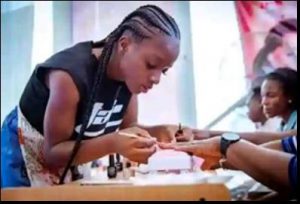

The 19-year-old mother and nail painter from Plateau State, Lisha Saleme Dachor, successfully wrote her name in gold and wrapped up her attempt to set a new Guinness World Record for the longest nail painting marathon by an individual.
At the event, tagged a “Nail-a-thon,” Dachor reportedly painted over 4,000 artificial nails in 72 hours. The Guinness World Record (GWR) states that for Dachor’s attempt to be decided, she must paint 60 fingernails per hour.
During the three days of the nail-a-thon, Plateau people dropped their tribal, religious, ethnic and political differences to support to Dachor as they trooped to Tamarald Event Center, Jos, to cheer her to victory. They were eager to support her so that something special would come out of Plateau State, something other than the sad news of attacks and mayhem for which the state had become so notorious in the recent past. Posts and reposts about Dachor’s epic attempt trended on social media, making Plateau State one of the most active on cyber space for the period it lasted.
Plateau State Governor, Caleb Manasseh Mutfwang, who was out of the country at the time, gave Dachor fatherly words of encouragement through live phone video. Also, one-time governor of the state, Joshua Chibi Dariye, politicians, political appointees, past and serving government officials, members of the organised private sector and ordinary citizens made stops over at the center to encourage the lady that had set out to make Plateau State proud by putting its name on the world map.
When she finally triumphed, Governor Muftwang took to his X.com handle to express his pride in Dachor’s victory and how she had, through her resilient spirit, put the state on the international radar, for the good reasons.
“I proudly join in celebrating Lisha Seleme Dachor’s record-breaking spirit of a young talent from Plateau State on her Guinness World Record attempt for the longest nail art marathon. Your determination aligns with my administration’s policy objectives for the youth and inspires us all,” Governor Mutfwang wrote.Dachor’s win immediately sparked a media frenzy as journalists jostled to report this rare story of great accomplishment, persistence and resilience coming out of Plateau State. One of the media events following her victory was a press briefing supported by the office of the Plateau State Commissioner of Information and the Nigeria Union of Journalists (NUJ), Plateau State Council, held on May 3, 2024, at the Crispan Pastry Shop, Jos.
The NIGERIA STANDARD reported that, during the press briefing, an apparently excited Lisha told newsmen: “The feeling is amazing, and I still can’t believe it, I need somebody to wake me up.”
She confessed that some people never believed that she could achieve that feat. “So, sponsorship was really hard to get. I went and dropped letters to companies and some of them didn’t even get back to me. By Friday, I wasn’t even sure how the event was going to hold, but God did it for me. My budget for the event was about N3 million naira,” she stated.
But what motivated her to forgo sleep for three whole nights of sleep in this fashion? She simply wanted to do something for her beloved Jos. Hear her: “I did it for Jos, they stood by me when I was down, so I wanted to prove to them that it is not just a waste of resources. They did it for me so I had to do it for them.”
“I basically had 24 hours to do it but I extended it to set the record to 72 hours. I have given a lot of people hope, I have heard a lot of comments and many people are happy that this success came to me, I have given my family hope, and shown northerners that we can actually do it,” she added.
Concerning her future plans, an optimistic Dachor said that she wanted to go back to school to complete her education. “My next step is to go back to school because I actually lost 2 years if my life, put my business in place, and make money for myself,” she said.
It would be recalled that, on April 25, Dachor announced her intention to take up the challenge from April 28 to May 1 at Odilin’s Event Centre, behind the National Library, Jos, the Plateau State capital. She also disclosed that free bus transportation to and from the venue would be made available for attendees.
In an interview with the BBC, Dachor said her aim was to use her record attempt to shine a positive spotlight on Plateau State. “People judge the Plateau by its cover. Apart from the ethnic issues we have, Plateau is a beautiful place. I got support from all ethnic groups while I embarked on this attempt,” she told the BBC.
She also embarked on the odyssey to change the negative narrative about teen mothers like herself. “I want to give people hope, especially single mothers, because many people don’t think we have anything to offer,” she added.
Enters Aisha: A true friend
There was another inspiring angle to the whole drama. The event also brought to light s display of true friendship by Aisha. She earned a fantastic reputation by standing by Dachor throughout the tiring and tedious moments.
Dachor praised Aisha’s inspiring friendship and disclosed why she didn’t give up even when she totally lost hope about completing that life-changing journey.
She said: “I started my attempt on the 28th and on the night of 29th of April, 2024, I told my Manager that I wasn’t going to do this again. So my friend, Aisha, my team and many other people, encouraged me. They went out to the streets at night to pull out girls for me to paint their nails for them.
“That is actually what friendship and support is all about because without it, I don’t think I would have reached anywhere because I needed 6 people per hour, 144 people per day. They made it happen. I was just sitting and painting nails.”
During a press interview at Crespan Hotel, Jos, Dachor re-emphasized the key role her friend Aisha played towards ensuring her success by going down memory lane: “I met Aisha when I went to Jay FM, Jos, to get support and they gave me the platform. I didn’t know she was going to stand by me this much. If she needed to rest, that is the only time she would go out. But she was with me throughout the event, I don’t think she stayed more than two hours without being close to me.”
Justice for woman whose fist was chopped off
By PALANG KASMI
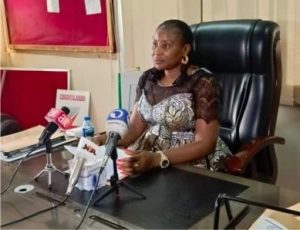
Dafur, briefing the press over the incident

POWA chairperson, Mrs. Adesina, comforting Hauwa at Plateau Specialist Hospital Jos

Women Affairs Commissioner Dafur, chairperson Gender Commission and her team, during the visit
LAST week, the news about a house wife, Hauwa Shagari, who had her fist chopped off by her husband, a police officer serving with the Plateau State Police Command, grabbed the headlines all over the country. The urgent calls for justice were as loud as they were strident and widespread considering the fact that such other cases in the past had been swept under the carpet without justice being served.
The victim, Hauwa, who resides with her husband in Dong community, Jos South Local Government Area of Plateau State, was seven months pregnant when he chopped off her fist after arguments ensued between them over N20,000.
Condemning the gruesome act, the Plateau State Commissioner for Women Affairs and Social Development, Caroline Panglang Dafur, during a press briefing said the police officer’s action against his wife on Monday, April 29, 2024, was the greatest act of man’s inhumanity to man, which was even made more horrendous because it was perpetrated by a supposed spouse.
“It is heartless and horrifying,” the commissioner declared, adding, “Mr. Ibrahim Shagari, a police officer and husband to Mrs. Hauwa Shagari, barbarically cut off her hand, a woman heavily pregnant for him and the mother of his three children. This heartless and horrifying act has left us all shocked and outraged. No woman deserves to be treated with such cruelty and violence, and it is even more unacceptable that this act was committed by a person sworn to protect and serve – a so-called police officer.”
The commissioner lamented that this was not the first time such a dastardly act was being committed against women. “Gender-Based Violence is a menace that affects countless women and girls in the country, sadly often remains shrouded in silence and secrecy, leaving countless individuals trapped in a cycle of fear, pain, and suffering,” she explained.
“This monstrous act of Gender-Based Violence that has developed wings and soaring over our skies must be brought down by good. Silence, secrecy and shielding of perpetrators must leave the ground where it is and constitute a storm in the sky, where GBV has now taken abode and battle it to the ground,” she said, assuring that her office, in conjunction with the Plateau State Gender Commission, were already investigating and collaborating to ensure justice is served to Hauwa.
“On Tuesday, 30th April, 2024 we were at the Plateau State Specialist Hospital, Jos, where the victim is responding to treatment. I want to assure Mrs. Hauwa Shagari and her family that we stand with them in this difficult time and will do everything in our power to ensure that justice is served,” Dafur asserted.
She revealed that the victim’s bills would be settled by government while her children were already being well taken care of by the state. “We intend keeping her in a safe place when she fully recovers,” said Dafur.
She further called on all citizens of Plateau State to break the cycle of silence, join in the fight against Gender-Based Violence, GBV, using the VAPP laws, to create a society where women and girls could live free from the fear of violence and discrimination based on their gender.
“This demonic act transcends race, gender, age, and socio-economic status. It affects our friends, neighbours, and loved ones. It robs victims of their dignity, their sense of self-worth, and their dreams. It fractures families and leaves scars that may never fully heal. How does Mrs. Shagari overcome the trauma of losing a hand to a man that is supposed to be her shield?” she wondered.
While appreciating the Nigeria Police Force, Plateau State Command, for swiftly arresting the perpetrator, Dafur kicked against those tagging domestic violence as a ‘Private Matter’ and gave this advice: “Every one of us has a responsibility to speak out against this injustice, to challenge the status quo, and to stand as allies for those who have been violated.”
Chairperson of the Plateau State Gender Commission and Special Adviser to the Governor on Gender, Barrister Olivia Dazyam, who was part of the press briefing, called for the enactment of laws that would halt the negative practice of negotiating with families of victims of such crimes which she said was a major challenge towards the dispensation of justice.
“We cannot keep on negotiating crimes to make the laws ineffective. We have the right legal frameworks but there is no impact. So it is the business of everybody as these things that happen from homes, not outside,” she noted.
The Chairperson of the Police Officers’ Wives Association (POWA), Mrs. Emmanuel Olugbenga, and her management team also visited Mrs. Hauwa Shagari at the Plateau Specialist Hospital to also express their sadness over the terrible incident.
The POWA chair, while comforting and encouraging the victim, expressed happiness that the doctors had assured that baby was doing fine and in a fine good condition. She disclosed that the purpose of the visit was to physically show support to Hauwa and let her know that she was not alone. She further promised that POWA would liaise with the Commissioner of Police to ensure her welfare and that of her children.
Another organization, Stand up for Women Societies (SWS), in a statement condemned the police officer’s action, describing it as wicked, brutal, barbaric and inhuman.
The SWS Chairperson, Mrs. Grace Gora, described it as yet another sad incident of Gender-Based Violence which affects women, girls and vulnerable groups in Nigeria. She lamented that it was deeply distressing that the crime was allegedly perpetrated by a police officer who is ordinarily supposed to be in the vanguard of protecting his family, citizens of the state and country at large from such vicious acts.
Gora tasked the Plateau State Commissioner of Police, Emmanuel Olugbemiga Asesina, and other critical stakeholders to ensure speedy dispensation of justice for the poor woman who was now carrying a permanent physical disability as a result of her husband’s callous action.
In an interview with THE NIGERIA STANDARD, the Police Public Relations Officer (PPRO), DSP Alfred Alabo, assured that the Plateau State Police command had already taken proactive actions on the matter.
He explained that the incident was sparked by an argument over the whereabouts of the N20,000 the police officer said he had kept somewhere which he was searching for to buy something for the family. It was in the heat of the argument that the brutal incident happened.
“It is not proper, it is not our way. Even as normal human beings, there are ways you settle issues. But for you to take up a cutlass and just chop off the hand of another person, and this other person happens to be your lawful wedded wife who is also pregnant, is so painful and disheartening,” the PPRO pointed out.
“So the Command frowns at this, it is a very sad one for us. His children are our children, even the unborn one coming into the world. This is very pathetic. But the Command has done what it is supposed to do, and we are assuring the general public that justice will be served,” he declared.
Earlier in a statement, the PPRO disclosed that the State Commissioner of Police, Emmanuel Olugbemiga Adesina, had also visited Mrs. Shagari at the hospital where he expressed his sympathy to her family and the entire good people of Plateau State over the sad incident.
The statement also assured the general public that the unfortunate act did not in any way portray the image or core values of the Nigeria Police Force.
The statement added: “We stand for justice, discipline, order and respect for the fundamental rights of all citizens of Nigeria. To this end, Inspector Shagari has since been arrested by the Command, detained and made to face all necessary disciplinary actions.”
Ways to find out if he’s really into you
By PALANG KASMI
IN their quest to find love, most women get so carried away that they don’t watch out for signs to know if the man they love and care about loves them too.
Many women have ended up heart broken simply because they failed to read some of the visible signs which show that he is not interested in having a serious relationship with them.
Some women just chose to ignore the signs even when they are visibly there for you to see; even when you do not need a soothsayer to tell you that he is not serious with you.

It is possible to find true love. But you must not end up with a man that does not really care about you. It is best to end the relationship than remain with a man who does not care about you.
Open your eyes and read what Stacey Laura Lloyd said on LiveAbout.com about how to decode signs that your man does not want to have a serious relationship with you.
“When you really like a guy, you may be trying to decode and interpret his every move in order to determine if he wants a relationship with you in the future. You may find yourself wondering what his intentions truly are, and you may even count how many times he texts you during the day to try and gauge if he’s interested in being your man,” says Stacy.
However, according to her, while you may want a long-term commitment, it’s important to pay attention to the following six clear signs that he doesn’t want a relationship with you:
He’s distracted when you’re together
Have you noticed that he’s always on his phone when you’re with one another? Do you find yourself having to repeat things because he isn’t paying attention to you? One of the clear signs that he’s not interested in having a relationship with you is that he’s distracted and disengaged when you’re together.
If his mind is elsewhere, he’s checking out mentally, and he doesn’t seem present, he’s actually presenting you with clear evidence that you’re not of much importance to him. But if he’s giving you his full and undivided attention and cherishes your every word, he’s showing you that you matter, and he’s far more likely to want a relationship with you.
He won’t make Long-Term Plans (LTP)
When you really like a guy, you may be eager to make long-term plans with him. For instance, you may want to invite him to your friend’s wedding a few months in advance, buy concert tickets ahead of time, and even nail down some dates for a trip together. But when a guy doesn’t want a relationship with you, he’s unlikely to commit to anything far off in the future. Rather than being excited by the prospect of being with you for these kinds of activities down the road, he’s hesitant and unable to give you a definitive “yes.” And if a guy doesn’t want to think about your future together, he should be history to you.
He doesn’t introduce you to his friends
Have you met his group of friends yet? When a guy is into you, he’ll make it a point to introduce you to the other important people in his life. Not only will he want his friends to meet you and get to know you, he’ll also want to see how you mesh with everyone, especially when he’s thinking about being with you for the long-term. However, if you haven’t yet met his friends or really anyone else who is significant in his life, he’s actually showing you that you’re not that significant to him. When a guy isn’t serious or truly interested in you, he’s not going to introduce you to his friends because it’s not worth his time and effort. And if this is the case, he certainly isn’t worth any more of your time and effort, either.
He’s unreliable
If you can’t trust him or count on him, you can count on the fact that he doesn’t actually want a relationship with you. When a man is unreliable and undependable, it’s because he hasn’t made you a real priority in his life. For instance, if he frequently breaks plans with you, is vague about his whereabouts, and isn’t forthright with you, he doesn’t want to be with you. After all, if he was serious about having a relationship with you, he’d try his hardest to keep his word and honor his commitments to you as much as humanly possible. But if he’s constantly letting you down, it’s time to let this guy go.
He’s frequently MIA
Does he disappear for days or even weeks at a time before you hear from him again? This is a classic sign of a man who isn’t truly interested in having a relationship with you. For example, when a guy goes MIA, it’s not uncommon for him to be more of a player and date other people on the side. When he suddenly goes dark, it’s typically because there are other people with whom he’d rather spend his time. And if you never really know when you’re going to hear from him again or see him again, this is a key indicator that he doesn’t want anything serious with you.
He’s emotionally unavailable
While you may have opened up to this guy and feel as though you can confide in him, it’s important to take a step back and look at his willingness to open up to you in return. Has he let you in emotionally? When a man doesn’t want a relationship, he’s going to keep conversations about his feelings and his past as superficial and light as possible. He’s not going to take the time to fully open up to you because he’s not emotionally investing in you or in a future relationship with you. Even if you’re comfortable being vulnerable around him and having personal discussions, his decision to be emotionally detached and keep you at a distance is a clear sign that you should be distancing yourself from him instead.
Showcasing the Gus cultural festival
By JIDAUNA DARING
CULTURE represents the customs, arts and social behaviors of a particular group of people. Recently, the Gus people of Jere District of the Pengana Chiefdom, Bassa Local Government Area, came out in large numbers to celebrate and showcase their rich culture through the annual festival tagged, ‘Gus Day 2024’. The colourful event was held at the Government Secondary School (GSS) Fuskan-Mata, along Zaria Road, Jos, Plateau State.
The epoch-making occasion, which was celebrated in grand style, has over the years remained a rallying point for the Gus people. It also served as an avenue for bringing together people who had lost touch with each other for a long time.
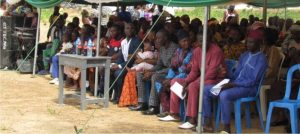
Interestingly, the Gus people, who are widely known for their peaceful disposition and hospitality, are also a hard working ethic group. Farming forms a significant source of their livelihood. They mainly cultivate crops such as maize, sorghum and cowpea, among others.
In his remarks at the event, chairman of the occasion and a consultant with the Jos University Teaching Hospital (JUTH), Dr. Simji S. Gomerep, commended the organizers of the festival and emphasized the need for the Gus people to continue according great value to their cultural heritage to enable the younger generation appreciate it.
Earlier in his welcome remarks, Gus National Development Association (GUNDA) President, Sunday E. Dakama, expressed delight and thanked God for making the event a huge success. He appreciated all the invited guests for gracing the occasion.
Dakama stated that the Gus people were friends and brothers to all tribes on the Plateau and beyond and gave kudos to Governor Caleb Mutfwang for supporting the Gus people in sustaining peace and tranquility within their domain.
He further praised the governor for finding two of their people, Elisha Bisidi and Mrs. Dorcas Gamaji Pankyes, and other illustrious sons and daughters of the larger Bassa LGA worthy to serve in his administration.
He explained that because the Gus people were mostly agrarian farmers, the festival was meant to usher the people into the new farming season.
Dakama appealed to the Plateau State Government and National Assembly legislators from the zone to assist the people with fertilizers, seedlings, agro chemicals and modern agricultural machines.
He pointed out: “We are faced with several challenges particularly the need for the rehabilitation of the Zallaki-Fuskan-Mata Banda road, which is in bad condition.”
While unveiling the Gus traditional attire, Dakama suggested the need to redesign it in order to confer on it a distinctive identity. “As we unveil the attire, we hope to emphasize the utilization of our colours to re-design it as we plan to establish a big symbol with a bold logo,” he noted.
On their part, some traditional rulers who are the custodians, of GUNDA culture advised their people to embrace peace, saying that without peace there can never be meaningful development.
In their separate remarks, Elisha Bisidi and Dorcas Gamaji Pankyes thanked Governor Mutfwang for appointing them as Liaison Officer, Pengana Constituency, and Special Assistant, Media, respectively. They assured of their unalloyed support to his administration so as to move the state to enviable heights and promised that they would not relent in serving Gus land selflessly.
THE NIGERIA STANDARD reports that the event featured cultural dances by the Isharuwa, Ajoh and Rilauri dance troupes and many other side attractions.
Inside story of a ransom negotiator
By PRIYA SIPPY
SULAIMAN is from Kaduna state, where 280 children were recently abducted from a school in the town of Kuriga.
He has been working informally in this controversial and risky role for several years since some of his relatives were taken hostage. “We have to negotiate. You cannot use force to get hostages back. It would put the lives of our loved ones in danger,” he said.
Sulaiman first became involved in negotiations with kidnappers, referred to locally as bandits, in 2021 a year before the payment of ransoms became illegal in Nigeria. Over the last three years he said he has negotiated the release of more than 200 hostages, a fraction of the thousands of people abducted over the last decade.
The negotiations take patience and courage.
“The government believes I have been helping the bandits,” he said, speaking from an undisclosed location.
“The bandits think I have been getting money from the government, so I am also a kidnap target.”
His first negotiation took place as he was trying to raise a ransom of around $12,500 (£9,800) for two of his relatives who were abducted.
“I did not know what I was doing. I was just speaking with the bandits – and begging them,” he said.
However, his patient approach with the gang members worked and at the end his relatives were freed though he had to sell his farm in his home village to cover the ransom.
AFP
When word spread about the successful release, other families who were victims of kidnapping came to him for support. Soon his phone was constantly busy.
“Almost everyone in my village has had a family member kidnapped,” he said, adding that he helps them regain their freedom. Despite the outlawing of ransom payments, people still come to him desperate for help.
Sulaiman admitted that it is a scary position for him to be. “The government does not like negotiation with the bandits, and can send people to jail for doing that.”
He recorded his success to the root causes of Nigeria’s kidnapping crisis, which he said is fuelled mainly by poverty and youth unemployment.
Competition for land and resources between cattle herders and farmers has also contributed to the problem. The kidnappers tend to be former herders from the Fulani ethnic group, who target villages where mainly Hausa farmers reside.
“When I speak to the bandits, I understand the people,” he said, adding that the negotiations tend to take place in Hausa, the lingua franca of mainly Muslim in the north, though most kidnappers’ mother tongue is Fulfulde, spoken by the Fulani.
“I tell them that I know they are living a difficult life in the bushes, without electricity. I know that they feel they have been forgotten by the government.”
The gangs are often made up of gunmen on motorbikes, who target areas and particular families on the words of paid informants. It is a huge, sophisticated money-making operation.
Around 30,000 bandits in more than 100 gangs operate in north-western Nigeria, according to the Centre for Democracy and Development a think-tank based in Abuja.
Sulaiman said the success of his negotiations depend on the leader of the kidnappers: “Some bandits I have dealt with still keep hostages and want more money, even after you have paid the ransom.
“But some of them release the hostages as soon as the specified amount is paid.”
The process can be arduous, taking up to 50 days to release a hostage.
“You have to use soft words. They can be rude and they will insult you but you have to remain calm,” he said.
Despite shortage of bank notes in Nigeria, kidnappers demand that ransoms be paid in cash as bank transfers can be easily traced.
Payments are usually delivered by either parents or relatives of abductees, Sulaiman explained.
“The bandits will call them and give them step-by-step directives on how to find them in the bush. Once they reach there, the will count the money, note by note.”
Sometimes the bandits request motorcycles as part of the ransom payment, as well as alcohol and cigarettes.
When another close associate of Sulaiman was kidnapped from a university along with other students before ransom payments became illegal, he said the government paid about $2,370 for each student’s freedom, though there has never been any official confirmation of this.
“The government will never admit on the record they paid because that would be admitting failure. But as insiders we know what happened and we didn’t have that kind of money,” he said.
Sulaiman became involved in those negotiations and said the kidnappers had first demanded about $32,000 for each hostage and were eventually bargained and slashed.
These days as villagers are left to foot the bills, only few can afford to raise the cash for ransoms. They often turn to crowd-funding, though this is now also proving difficult given how the insecurity has devastated the economy.
Bandits have been known to either kill hostages or release them when there is no hope of payment.
Sulaiman thinks the spate of recent mass abductions from schools, and the threat to kill the students, may be a ploy to get the authorities to take notice: “They think the government will pay.”
There are reports that the authorities have continued to pay ransoms on occasion – though this is always denied.
President Bola Ahmed Tinubu has taken stringent measure to say “not a dime” will be paid for the recently abducted children of Kuriga, directing the security forces to ensure their release.
Between July 2022 and June 2023, armed gangs demanded more than $6m as ransom, according to a report by SBM Intelligence, a security risk consulting firm.
The ransom negotiator agrees with the authorities that continuing to pay up will just fuel the kidnapping business: “Ransom payments encourage kidnapping. The bandits are just looking for money.”
But he is certain that the heavy-handed approach of military force is not the answer: “If I can advise the government, they should meet these people and have dialogue with them.”
Until then, Sulaiman fears the next time his phone rings, it will be another abduction case.
Determined to keep helping his community, he is sure to answer the call.
Courtesy, BBC
On PLHA’s plenary proceedings and activities
The Plateau State House of Assembly (PLHA) has relocated its plenary sessions to the Old Government House, Rayfield. This according to the Speaker Rt. Hon. Moses Thomas Sule, is to allow it carry out renovation work at the assembly complex. Another reason for the relocation is to avoid all forms of distractions and disruptions, due to the ongoing strike by the Parliamentary Staff Association of Nigeria (PASAN).
During the first plenary held at the temporary venue, a notice of motion was moved by Hon. Danjuma Azi who is the member representing Jos North West constituency, calling on the Jos Electricity Distribution Company (JED) to as a matter of necessity resolve all issues leading to power surge and explosion of transformers.
You would recall that a couple of weeks ago, Kabong community around Gada Biu area of Jos North West witnessed a power surge and explosion which led to the loss of many lives. The explosion which happened at the early hours of the morning, caught the residents unaware as nothing could be done to stop the inferno.
The lawmaker who is also the House Committee Chairman on Appropriation is also not resting on his oars towards ensuring that members of his constituency enjoyed uninterrupted power supply. For the past seven months, residents of Angwan Lagos, Tudun Wada have been thrown into total darkness following the theft of a part of the transformer.
In an effort to see that the problem is addressed and power supply restored to the area, Azi has been on the forefront as he has even visited the Chief Operations Officer of JED Jos, Engr. Mammanlafia Umar. In connection to the visit, the lingering issue of fixing the 500KVA transformer behind Tudun Wada Police post was also resolved, with the promise that work will commence on it immediately.
Also at plenary, the bill for a law to provide for the creation and administration of the Plateau electricity market, establish a commercial and technical regulatory framework for the Plateau electricity market; to ensure reliable and universal access to electricity for all residents of Plateau State, to establish the Plateau State Electrification Agency and the Plateau State Electrification Fund for the delivery of reliable electricity supply to the unserved and underserved areas of the state; and for connected purposes scaled through second reading.
The bill is being sponsored by Hon. Ishaku Maren who is also the House Majority Leader and member representing Bokkos constituency. Scaling through second reading is ‘A Bill for a Law to Repeal and Re-enact the Plateau State Energy Corporation Law, 2019 still under Hon. Maren.
Last but not the least for second reading was ‘A Bill for a Law to Establish the Plateau State House of Assembly Service Commission and for Related Matters, 2023. The bill is sponsored by Hon. Ishaku Maren, representing Bokkos constituency, Rt. Hon. Gwottson Fom Dalyop, Jos South constituency, Hon. Bala J. Fwangje Mangu South constituency, Hon. Adamu Aliyu Jos North North constituency, Hon. Joseph Bukar Shendam constituency, Hon. Gabriel Dewan Kudengbena Pankshin North constituency and Hon. Ibrahim A. Agbalak representing Rukuba/Irigwe constituency.
Meanwhile, the Plateau State House of Assembly has approved and passed the appropriation bill of N314. 8bn for the 2024 fiscal year. This followed the presentation of a proposed budget estimate of the sum of N295,434,568,464.00bn by the state Executive Governor, Barr. Caleb Manasseh Mutfwang before the floor of the House for consideration on Tuesday, 7th October.
The 2024 budget ragged “A Budget of New Beginning’ is aimed at laying a solid foundation for the peace and prosperity of the state, with emphasis on security, agriculture, human capital development, public health, and industrialization and aggressive revenue generation.
The state assembly also approved the sum of N27,000,000,000.00bn only as supplementary budget for the 2023 fiscal year. This according to the state Governor Barr. Caleb Manasseh Mutfwang was in consideration of the fact that the budget already adopted, was inherited by his administration upon assumption of office in May, 2023 and not a reflection of his administration’s agenda.
Four major hindrances to receiving from God (22)
WE have been talking on four things that the Lord quickened in my spirit which I believe hinder us from receiving from God. Now, like I have said a number of times, this is not an exhaustive list but I believe that for this season of our lives, knowing this list is enough to get us going and seeing victories.
By way of recap, these four hindrances are fear, doubt, unbelief and strife. We dealt first of all with the hindrance of fear, then the second, doubt, which we spoke exhaustively on. All these hindrances are things that Satan brings to our lives through our minds. Satan is primarily a deceiver. He does not have any say over a believer but his greatest weapon is his ability to deceive, plant thoughts, ideas and suggestions in the mind of believers.
Today, I want to deal with the third major hindrance to receiving from God which is the hindrance of unbelief. We have talked about fear; we have talked about doubt, now we will talk about “unbelief’. Keep dealing with fear, keep dealing with doubt, and keep dealing with unbelief. These are the things that pollute the action of God’s power and hinder it from flowing in your life.
Satan is the same old devil he has always been but thank God, God is the same old God He has always been too. So, no matter how complicated the human society becomes the principles that power human lives are still the same.
Mark 6:1&2 And he went out from thence, and came into his own country; and his disciples follow him. And when the sabbath day was come, he began to teach in the synagogue: and many hearing him were astonished, saying, From whence hath this man these things? and what wisdom is this which is given unto him, that even such mighty works are wrought by his hands?
Isn’t it amazing how sometimes in life, you find people who do not want to admit what God has done in your life and how that you have moved on? Some people just want to keep you in the image of your past.
Mark 6:3 Is not this the carpenter, the son of Mary, the brother of James, and Joses, and of Juda, and Simon? and are not his sisters here with us? And they were offended at him.
Mar 6:4-6 But Jesus said unto them, A prophet is not without honour, but in his own country, and among his own kin, and in his own house. And he could there do no mighty work, save that he laid his hands upon a few sick folk, and healed them. And he marvelled because of their unbelief. And he went round about the villages, teaching.
Jesus could not do all that He intended to do because of their “unbelief”. Some people have this idea that God is God and so He can do whatever He wants to do, whenever He wants to do it. But God is not insane, He operates according to order; after all He is the one that said let things be done decently and in order.
I have been some places where I heard the preacher say things like “the anointing is so heavy here in this church today and so whether you like it or not, you will be blessed”. That is just the preacher’s talk not God’s because that is not scriptural.
Some people say things like “I tell you, God will do whatever He is going to do. If God has purposed that you are going to become this in life, you will become it in life”. But the truth is that there are many people that God has purposed many things about, yet they have not become it.
It does not happen automatically; there is order to everything God does. 1 Cor. 14:40 says, Let all things be done decently and in order. How many of you know that when Jesus was on earth, even though He stripped Himself of the privileges of being divine, He was still God? He was God in the flesh upon the face of the earth yet the Bible said he could there do no mighty work, save that he laid his hands upon a few sick folk, and healed them.
Something happened that totally hindered God from moving. It hindered Jesus from moving. The Bible says He could do no mighty work. That means that in some places Jesus got more results than in other places. That means that in some places, He got more outstanding healings. In some places, the anointing upon Him functioned to a greater degree than in other places.
Why Was this? Well, at least in this case from Mark 6 we know that it had to do with unbelief borne of familiarity. Familiarity had trapped the anointing. They looked at Him and acknowledged the work but they said, is he not the boy that grew up in our midst? Is this not the carpenter we know? What they failed to realize was that after He went into the wilderness and came back, He was not just the carpenter’s son, He was the anointed one.
Familiarity which tends to lead to dishonor and devaluation hinders the anointing from operating. This is true because it is what you place value on that you draw virtue from. These things are laws of the Spirit.
So it is said here, He could do no mighty works. Save that He laid His hand upon a few folk and healed them; this is, He could only heal a few with minor ailments. Think on this, in some places He could raise the dead while in other places; He could only heal tiny headaches, not even stubborn migraines. Just tiny headaches that Panadol could solve or your grandmother’s local prescriptions could solve.
He could there do no mighty work, save that He laid His hands upon few sick folk, and healed them. And the Bible said He marveled; do you know what that means? Jesus was in shock. He marveled because men just stopped the anointing. They hindered the anointing from working.
An anointed man can come into a meeting yet because of the sort of crowd in that meeting it will be as though he was not anointed. This is because there are laws that govern the anointing and one of those laws is that the anointing must be respected and of course you cannot respect the anointing without respecting the vessel that carries it.
The people in Mark 6 had low regard for Jesus and so He could do no mighty work in their midst and the scripture said He marveled because of their unbelief. He was in shock because, here He was, anointed to bless them but nothing could come out of Him and the Bible explicitly tells us that this was because of their unbelief.
They said among themselves, look at this guy who grew up in our midst, we know him, right down to his root and because of that, they could not get the full benefit of His ministry.
What I am trying to point out to us in this whole matter is the word unbelief. I want us to clearly see and realize that unbelief stops the movement of the power of God. Unbelief totally hinders the power of God from working in our lives. When the anointing of God is flowing and it meets unbelief, it cannot work.
If we know and understand this truth, then what you must do is to locate unbelief and get it out of your life,
To be continued…








